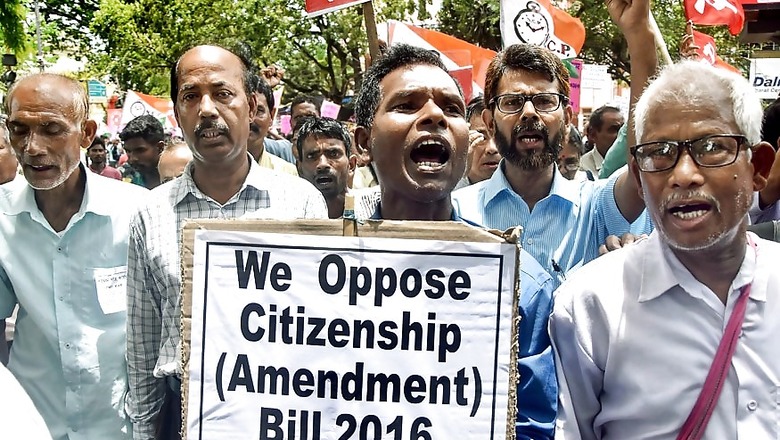
views
New Delhi: Following two-day-long discussions between Home Minister Amit Shah and representatives of students’ bodies and civil society groups of Assam, the union cabinet cleared the contentious Citizenship (Amendment) Bill, or CAB, on Wednsday. It will be taken up in the Parliament next week, sources have told News18.
Here's a ready reckoner:
What is the Citizenship (Amendment) Bill, 2016?
The Bill, which proposes to amend the original Citizenship Act of 1956, seeks to grant Indian citizenship to non-Muslim refugees - Hindus, Jains, Christians, Sikhs, Buddhists and Parsis - from Bangladesh, Pakistan and Afghanistan if they have fled their respective country due to religious persecution. It also proposes to reduce the mandated 11 years of residence in India for citizenship eligibility to six years.
If the Bill is passed, persons belonging to these communities would not be jailed or deported under the Passport (Entry into India) Act of 1920 and the Foreigners Act of 1946. It sets December 31, 2014, as the cut-off date after which any person moving to India from these neighbouring countries will be considered for citizenship.
Why is the Bill facing criticism?
This proposed legislation has received considerable flak due to the perceived threat to minorities. While the National Register of Citizens (NRC) exercise in Assam did not distinguish illegal immigrants on the basis of religion, critics say the Bill is designed to exclude Muslims and favour Hindus.
According to detractors, the Bill also goes against Article 14 of the Constitution which guarantees the right to equality. The bill seeks to give citizenship on the basis of religion.
Why is there strong opposition against the CAB in the Northeast?
The All Assam Students Union (AASU), which was instrumental to the Assam Accord of 1985 leading to the updation of the NRC, has slammed the Centre saying the CAB nullifies the agreement between then-PM Rajiv Gandhi and the state. The cut-off date in the Accord was fixed to March 24, 1971 and not December 31, 2014 for consideration of Indian citizenship.
Civil society groups from the Northeast that met the home minister last week echoed a similar response as the AASU. They said it threatens to 'minoritise' its indigenous population by absorbing a Hindu population. In Assam, where the recently published final NRC excluded 19 lakh people, the public has opposed the BJP-led Centre’s intention to absorb certain Bangladeshis based on their religion.
Assam, Manipur, Nagaland and Meghalaya have repeatedly witnessed unrest ever since the Bill was introduced in 2016. Shah’s visit to Mizoram in October was met with protest marches and demonstrations by civil society groups.
How different is the CAB from the NRC?
The BJP leadership says that while the latter intends to detect persons living illegally, the former is the right of persecuted minorities in the neighbouring countries to avail Indian citizenship.
Indeed, both the NRC (a provision in the Assam Accord) and the citizenship Bill serve different purposes. But the communal undertone of the Bill and the geographic criteria of migration from Bangladesh, a Muslim-majority country, in the NRC has created confusion, say observers.
What are the reactions in New Delhi regarding the Bill?
The recent meetings with the home minister took place days after Meghalaya chief minister Conrad Sangma on November 22 met Shah in Delhi and discussed the “need for proper consultation and the need to engage with stakeholders”, to which Shah agreed.
But, political opposition in the capital had surged to a new high when the All India United Democratic Front (AIUDF) from Assam along with other opposition parties, Congress, Trinamool Congress, Communist Party of India (Marxist), etc, had taken up the tabling of the Bill with Rajya Sabha chairman M Venkaiah Naidu during the business advisory committee meeting held last week to discuss the agenda for this week.
The Opposition had even pressed for an adjournment motion on the Bill on the first day of the Parliament’s winter session.
What is the BJP’s political gain or loss from the Bill?
The shaky part for the BJP lies in managing its electorate as it endorses both a pro-citizenship law and one against it. The Bill has found support in Assam’s Barak valley which has a high concentration of Bengali-speaking Hindus.
The Asom Gana Parishad (AGP), a signatory to the 1985 Accord and a supporter of the NRC, had left the alliance with the BJP after the Bill was passed in the Lok Sabha. In Manipur, where the BJP is in power, chief minister N Biren Singh, too, has expressed the state’s concerns.
In Meghalaya, the United Democratic Party (UDP) and the National People’s Party (NPP), the BJP’s partners in the state, have opposed the Bill. The Nagaland government too has expressed its reservations over the CAB.














Comments
0 comment